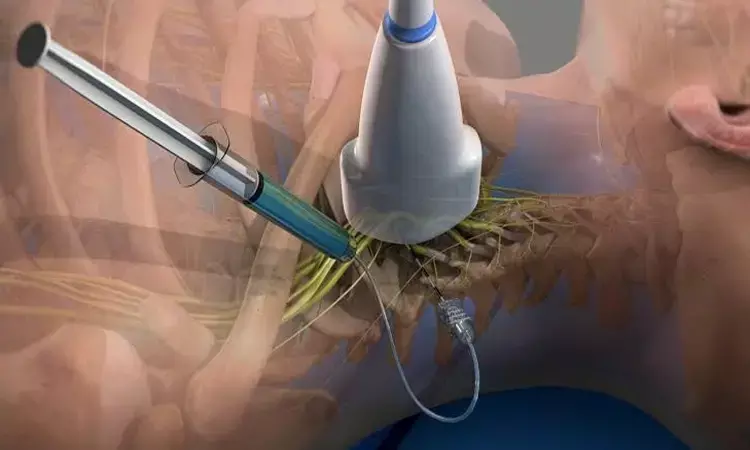- Home
- Medical news & Guidelines
- Anesthesiology
- Cardiology and CTVS
- Critical Care
- Dentistry
- Dermatology
- Diabetes and Endocrinology
- ENT
- Gastroenterology
- Medicine
- Nephrology
- Neurology
- Obstretics-Gynaecology
- Oncology
- Ophthalmology
- Orthopaedics
- Pediatrics-Neonatology
- Psychiatry
- Pulmonology
- Radiology
- Surgery
- Urology
- Laboratory Medicine
- Diet
- Nursing
- Paramedical
- Physiotherapy
- Health news
- Fact Check
- Bone Health Fact Check
- Brain Health Fact Check
- Cancer Related Fact Check
- Child Care Fact Check
- Dental and oral health fact check
- Diabetes and metabolic health fact check
- Diet and Nutrition Fact Check
- Eye and ENT Care Fact Check
- Fitness fact check
- Gut health fact check
- Heart health fact check
- Kidney health fact check
- Medical education fact check
- Men's health fact check
- Respiratory fact check
- Skin and hair care fact check
- Vaccine and Immunization fact check
- Women's health fact check
- AYUSH
- State News
- Andaman and Nicobar Islands
- Andhra Pradesh
- Arunachal Pradesh
- Assam
- Bihar
- Chandigarh
- Chattisgarh
- Dadra and Nagar Haveli
- Daman and Diu
- Delhi
- Goa
- Gujarat
- Haryana
- Himachal Pradesh
- Jammu & Kashmir
- Jharkhand
- Karnataka
- Kerala
- Ladakh
- Lakshadweep
- Madhya Pradesh
- Maharashtra
- Manipur
- Meghalaya
- Mizoram
- Nagaland
- Odisha
- Puducherry
- Punjab
- Rajasthan
- Sikkim
- Tamil Nadu
- Telangana
- Tripura
- Uttar Pradesh
- Uttrakhand
- West Bengal
- Medical Education
- Industry
Combo of GA and interscalene brachial plexus block effective for shoulder surgery: Study

Research showed that ISB/GA resulted in significantly lower epinephrine, norepinephrine, and glucose levels perioperatively.
China: A recent study published in the journal BIO Integration, suggests the combined use of interscalene brachial plexus block with general anesthesia (ISB/GA) as a preferred anesthesia method for arthroscopic shoulder surgery.
In this article, Daowei Lin, and his team from Sun Yat-sen University, Guangdong, China, The First Affiliated Hospital of Zhengzhou University, Zhengzhou, Henan, China and University of Virginia, Charlottesville, VA, USA discuss how interscalene brachial plexus block combined with general anesthesia attenuates stress and inflammatory response in arthroscopic shoulder surgery.
In arthroscopic shoulder surgery, general anesthesia (GA) is the common method of anesthesia. Recently, the combined usage of interscalene brachial plexus block with general anesthesia was reported to have a lower incidence of adverse side effects than GA alone. However, to date, no study has compared stress and inflammatory responses between these two methods. Since stress and inflammatory responses are critical on intraoperative management and postoperative recovery, the authors of this study integrated the laboratory and clinical methods and compared the stress and inflammatory factors, such as epinephrine, norepinephrine, glucose, lactate, inflammatory factors tumor necrosis factor α (TNF-α) and interleukin 6 (IL-6), as well as the clinical outcomes to determine whether ISB/GA provides an advantage on stress and inflammatory inhibition.
Data showed that ISB/GA resulted in significantly lower epinephrine, norepinephrine, and glucose levels perioperatively. Six hours after the operation, the TNF-α and IL-6 levels were also significantly lower in the ISB/GA group. ISB/GA patients had lower blood pressure, a more stable heart rate, lower visual analog scale score, and less opioid consumption during and after surgery. The results indicate that ISB/GA is a better choice for arthroscopic shoulder surgery, owing to less stress and inflammatory responses during and after operation, which provides better clinical outcomes.
Reference:
The study titled, "Combination of Interscalene Brachial Plexus Block with General Anesthesia Attenuates Stress and Inflammatory Response in Arthroscopic Shoulder Surgery," is published in the journal Bio Integration.
DOI: https://www.ingentaconnect.com/content/cscript/bioi/pre-prints/content-20210013
Hina Zahid Joined Medical Dialogue in 2017 with a passion to work as a Reporter. She coordinates with various national and international journals and association and covers all the stories related to Medical guidelines, Medical Journals, rare medical surgeries as well as all the updates in the medical field. Email: editorial@medicaldialogues.in. Contact no. 011-43720751
Dr Kamal Kant Kohli-MBBS, DTCD- a chest specialist with more than 30 years of practice and a flair for writing clinical articles, Dr Kamal Kant Kohli joined Medical Dialogues as a Chief Editor of Medical News. Besides writing articles, as an editor, he proofreads and verifies all the medical content published on Medical Dialogues including those coming from journals, studies,medical conferences,guidelines etc. Email: drkohli@medicaldialogues.in. Contact no. 011-43720751


